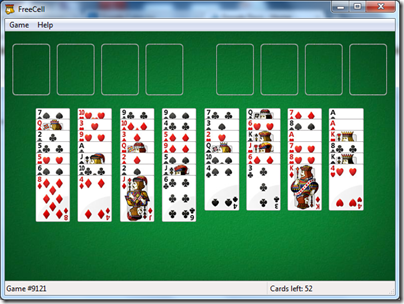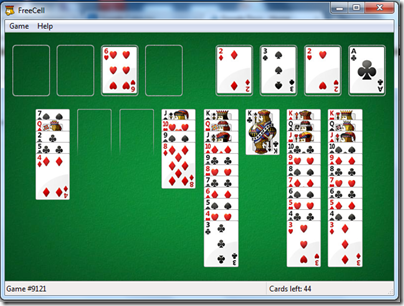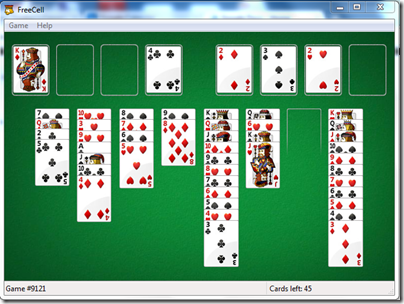One of the paradoxes of TPS is the inherent distaste for ambiguity. A TPS practitioner doesn’t like to leave things to hope and chance that someone will work it out.
What makes this a paradox is that we simply can not see accurately more than a few steps ahead. The world just has too many variables that we can’t control.
And even if there IS the possibility of developing a 100% certain plan – a set of instructions that simply require execution, actually doing so is overwhelmingly complex.
Consider this trivial example.
Here is game #9121 in Microsoft Freecell:
If a Freecell game is winnable (and there are a very few that are not), then by looking at the starting point it is theoretically possible to construct a list of moves which will result in a win.
Game 9121 is winnable. I guarantee it.
OK – given that you know are certain there IS a winning combination of moves, please look at this starting point and develop a plan – a list of the moves which will result in a win. Let me know when you are done, then we will try to execute and see if you are right or not.
Done?
Great. How did that feel?
Keep in mind that you have two real advantages here –
- You knew that winning the game is possible – there is a solution to the problem. In the real world, that isn’t always the case.
- This is a simple game. It is trivial compared to even the simplest real-world cultural and technical change problem.
Yet, in spite of those advantages, you probably didn’t see a really clear path from the starting point to the final state.
Now, take a look at this state of the same game:
If you know anything about the game, you know that, with two more moves, the rest of the cards will be free to auto-clear to the top. (the five of clubs / four of diamonds to a free space – which will auto-clear the two of clubs; then the queen to either a free space or to the black king)
This state requires no challenge at all. What to do next is obvious, it is simply a matter of doing it.
In the middle of the game, though, it looked like this:
To the experienced eye (which I have, sadly), this game is clearly winnable from this point. We aren’t down a dead-end condition that has no path out.
The next couple of moves are pretty clear, and I am 100% confident those moves will, in turn, reveal more, and the game will be won. (Truthfully, it reached that point much earlier, but wasn’t as obvious as it is here.)
Scripting the moves from this point is still more difficult than just playing them, though.
So what’s the point here?
As you construct improvement objectives and plans –
It is impossible to script every single move from the beginning. What you can do is be clear where you are trying to go, understand the rules, and be willing to try a few things and back out if you end up at a dead end.
It is important to have an overall strategy in mind. That gives you intermediate targets and goals that, if reached, should be progressing you toward the final objective. In this game, for example, I am generally trying to free up the aces, and build stacks on kings. Anything that advances me toward those intermediate goals is also advancing me toward winning.
Once the solution is obvious just execute it. Don’t call it “problem solving” or patronize people by making them build an A3 for something that requires no thought.
Seeing clear progress is important. So is a general sense that the game is winnable. Without that, people lose hope, which they demonstrate by losing interest.



Mark,
Awesome post. It reminds me of my previous role as a project manager for a “lean implementation”. It didn’t go so well, but I learned alot. :o) My boss would constantly ask me for the “road map”. Creating that “road map”, at the end of the day, was an exercise in futility. It was like trying to predict the flight path of a bumblebee.